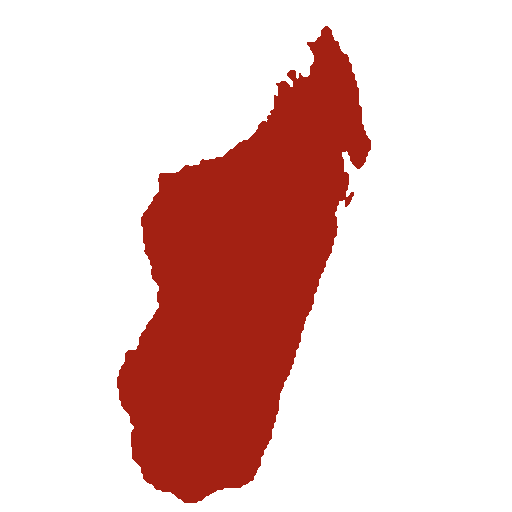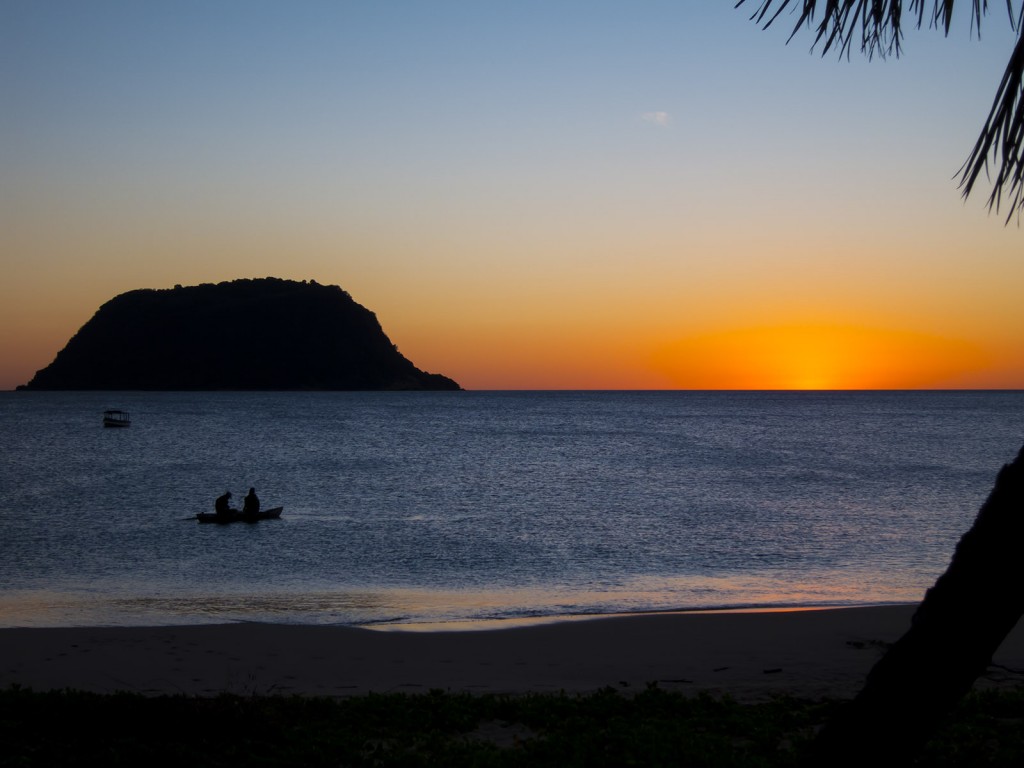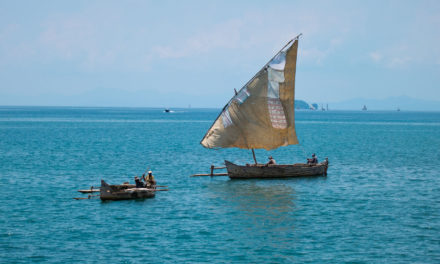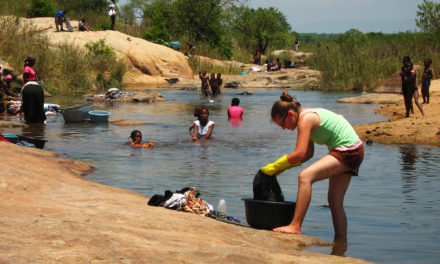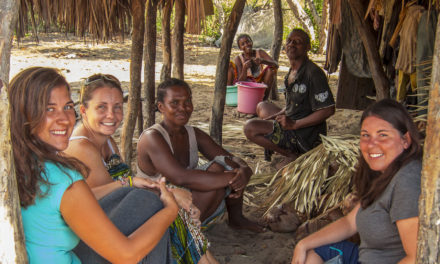T he east wind picks up and we begin to feel a prickling in our skin. First one spot, then another. It blows harder and it gets worse. Like a small pinprick, a burning and itching sensation, a couple seconds on my arm, then the back of my head, then my leg, one scratch then another; as soon as one burning itch on one part of my body goes away, it’s replaced by another one or two somewhere else.
There’s an invisible menace floating on the wind, carrying poisonous microscopic thistles that attach to every surface they encounter, exasperating adults and making babies and small children cry. When the wind picks up hard, making the symptoms even worse, it often blows for days. And even when the wind dies down, that irritating residue is left behind for days more, sticking to the inside and outside of the house, to clothes and blankets, tables and chairs, everywhere!
It’s called “tainkilotra” and it’s probably the most aggravating surprise we’ve had since first moving to Nosy Mitsio. Thankfully, it has no effect throughout the rainy season, so we’ve recently passed many months in peace. But now that it’s the dry season again, we have many irritating months to look forward to. When I first wrote about this plant soon after we moved to Nosy Mitsio, I had misidentified it with another (less irritating) plant called “lantana.” It turns out that I haven’t yet seen “tainkilotra” with my own eyes, but I’ve certainly seen its effects. It’s terrible! I’ve wondered for a long time about what something so aggravating actually looks like. I’ll know soon enough.
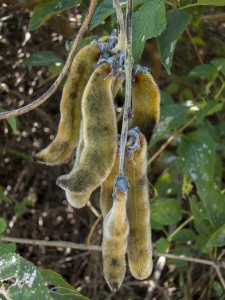
This is the terrible plant! Not too bad-looking really, but if you zoom in very close you can see the tiny little thistles that cause so much trouble.
It amazes me how something I can’t even see can wreak so much havoc on such a widespread area, crippling the day-to-day lives of everyone it touches. Even the goats and cows are rubbing against trees and rocks, trying to find some relief from that terrible plant. (Amazingly, our cat doesn’t seem bothered at all; perhaps its fur coat does a great job of protecting it.) When the east wind is blowing strongly, greeting others is no longer done with hand gestures, because everyone’s hands are necessarily occupied with scratching their burning itches! If there’s a baby around, it can’t help but whimper. Kids roll around in the sand, seeking relief, but their parents say it doesn’t actually help at all.
We all commiserate together, swapping ideas for how to avoid tainkilotra’s effects. Putting extra sheets on the top of the bed can catch the invisible thistles, to be shaken out and removed before sleeping at night (when we’ll surely be itching regardless, from whatever tainkilotra works its way into the house as we sleep; but maybe the extra sheets during the day help some). Rubbing coconut oil all over the skin is said to help, but we didn’t notice any definite improvement when we tried it. Long sleeves seem to help for a time, as an extra barrier to the tainkilotra, but we have a shortage of long-sleeved clothes, living on a tropical island as we do. The potential methods for fighting tainkilotra are lamentably limited, but my mind is already spinning with an idea for destroying it all, right where it grows. I just have to find it and identify it first.
I n thinking about all of this (trust me, I’ve thought long and hard about how to remove this aggravation from our lives), it got me thinking about other hidden influences on life here on Nosy Mitsio. To people here, their ancestors are ever-present, unseen, but bringing tremendous effect on their day-to-day lives, even more so than the terrible tainkilotra. Their ancestors are always observing, always seeing, and always ready to curse and reprimand, to ensure they’re receiving the desired amount of respect and obedience.
People here adjust their lives dramatically to appease their ancestors, to escape or remove the negative effects that can so suddenly be brought by them. And if something can be done to especially please the ancestors, they may even get a positive result from them. So there are sacrifices to do and spirit possessions (some invited, and some inescapable) and prayers to say and holy places for special entreaties and taboos to avoid and “ways” to follow… all of this to accommodate for the incredible influence of the unseen ancestors in their lives.
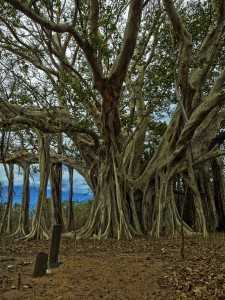
A fig tree on Nosy Mitsio that’s considered a sacred space for people to communicate to their ancestors and perform rituals. The rocks in the foreground are for offerings/sacrifices.
To me, all of this is bewildering. I haven’t yet even approached the ability to wrap my mind around what this must be like for them. To rely on the whims of incredibly powerful, but invisible, people all around them. The lists of what to do (including how to do it) and what not to do are astounding – I can’t even imagine how they keep track of it all! It’s different from person to person and family to family and village to village and tribe to tribe, more often than not varying based on the phases of the moon or the day of the week or the direction one is facing or the proximity to a holy place. And this is somehow important to those members of their family who have died and preceded them to the invisible realm of the ancestors? All these minutiae of when your cow’s milk can be boiled in your house or your neighbor’s house, and what day of the week you can take a long trip from home, and during which phase of the moon you can put in the first pole of your new house… all of this is important enough to your unseen ancestors, that you risk your life (and maybe the lives of everyone in your village) if you defy it, purposefully or accidentally? To me it makes no sense at all, and the more instances I learn, the more and more confounded I am.
Nonetheless, it’s there. This is the foundation of their lives on Nosy Mitsio, and for nearly all Antakarana people. Unseen or not, the effects on their lives are clear and they must be considered carefully. Whether the negative effects truly come from their ancestors or some other set of evil spirits or simple incorrectly attributed coincidence, I have no idea. My own perception of the “spiritual world” is pretty shallow, and most of it is unknown to me, besides the God, Jesus, who chose to reveal himself to me, through his Holy Spirit. I don’t know anything with certainty about the rest. But I know that the Antakarana ancestors, whether only in their minds or by actual presence, are the single greatest oppressor to the living Antakarana people. Jesus is the Liberator, and I know he wants to free them and he has the power to do so, to bring new life instead of perpetual death. So to properly introduce Jesus to the Antakarana, to more fully reveal his greatness and his ability to set them free, I need to also understand what this “prison” looks like from their perspective. So we live with them, and we talk to them, we observe their lives and their rituals, we ask questions and answer questions, we’re their neighbors and their friends. And through this we believe the Holy Spirit will help us understand them, and he’ll reveal himself to them.
A ll this thinking about the “unseen world”, considering it very heavily lately, has also got me thinking about where it exists everywhere. I don’t recall anyone in the US ever talking to me about their ancestors with any sense of spiritual power, and though some may believe in ghosts and other “haunted places” or luck or other minor superstitions, most Americans and Westerners in general have very little perception or consideration of life beyond the material. Does that mean it’s only the forces we see which affect us? Are our gods only the ones that we choose and can name? I think not.
Any commanding force or idea in our lives that takes a principle place and shapes our lives around it can in fact be a “god”. The modern American Dream is the idea that a better job and a better salary (and all the perks that go with it) will make a better life, for us or for our children. People gruel away to get a degree they’re not interested in, work overtime to make their boss happy, even assume their corporation’s values of improving the bottom line and contribute any effort to do so, all in service of this great dream of increased money or influence in their lives. And because of all the effort that requires, many are the family members sacrificed on the altar of this “American Dream.”
But that’s an easy one to pick on. Others (many in my generation) live their lives just as passionately in the pursuit of entertainment, or of a great new “experience”! I can’t say I haven’t felt the sway of that particular god myself. Some just want to make other people happy, but are led through that to all sorts of bad decisions and to feelings of possessiveness. Then again, the desire for safety and security lead some people to overly sheltered lives, to excluding others and focusing on self, shutting themselves off from the realities of life and trust in God. Some even make a particular ideology itself their god, whether it’s a political party or a denominational affiliation or a dogmatic doctrine, whatever it is that causes them to be hateful or scornful of anyone who disagrees or isn’t interested. I’ve felt the temptation of that god too, and I know I’ve sacrificed to him before.
These and countless more are the gods who inhabit our spiritual realm. Some of these ideas or motivations may even have positive aspects, or may have begun well enough, but when they take over a person’s life, they’re gods.
O ur “unseen world” full of its spiritual forces and its petty, bickering gods may not be quite so obvious as the gods of our ancestors, or as obvious as the ancestors of the Antakarana. Or maybe it’s just not so obvious to us who obey them. But they’re there. They’re just like anything else that pricks the skin, that elicits a reaction, that eventually shapes so much of our life around it, in service to it.
In a different time and place, the apostle Paul wrote,
Many people think these things Paul wrote about were personal spiritual beings, and maybe some of them are. But rulers, authorities, and powers are anything which coerces us to serve them. And there are plenty of these authorities vying for our attention, and our lives, compelling us to subservience, no matter where we live or which culture contains our lives. The motivations to serve them are sometimes fear, and sometimes desire, sometimes pride, and sometimes despair, but never love. I know of only one God of Love, who himself is motivated by love (because he is love) and who motivates us to follow him by love, and to serve those around us through love.
It’s through love that these tyrannical forces of the unseen world will be destroyed. Because where love is, the kind of love that comes from God, these inferior gods no longer exist; they no longer have the force to captivate. Oppression will cease, pride disappears, and neither people nor anything else will ever again be sacrificed. The one sacrifice we need has already been made. In serving nothing and no one but God (the God who became a servant on our behalf), he who we serve empowers us by his love, to love him in return and to love those around us. And all the lesser gods and spiritual forces and authorities will die and will no longer hold anyone captive. It’s by God’s love for the Antakarana people, and his love that he’s forming in us, that we’re here to reveal his freedom to them. Neither tainkilotra nor anything else can stop it.
So next time you feel a little prickling under your skin, you feel that invisible tug to wrap your mind and your lifestyle around some unseen force, pay attention to who it is and how it’s calling you. If it’s not love, then it’s some inferior power; it’s the enemy and it needs to be uprooted from your life. Look instead to God, because it’s by his power and love that the enemy has been defeated and he’ll empower you to see the same freedom in your life as well.
In Christ,
Adam, Lora, and Matimu
